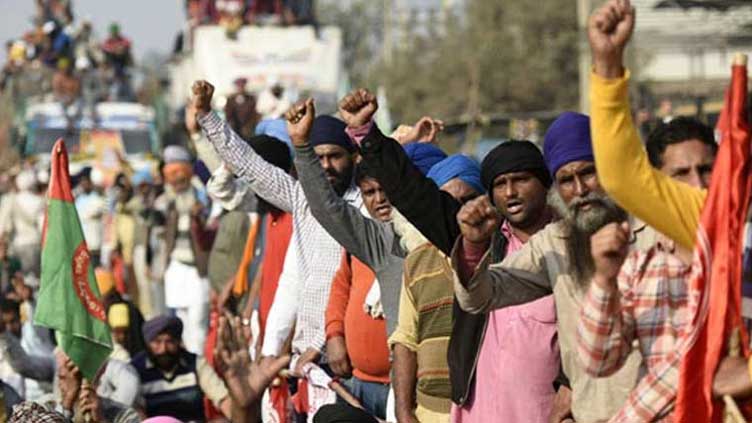Indian farmers frustrated with Modi government, suicides on the rise

World
According to NCRB, over 42,000 farmers took lives between 2019-2022
NEW DELHI (Web Desk) - India’s struggling farmers continue to grapple with critical issues, including a lack of storage facilities, ineffective procurement systems, and inadequate Minimum Support Prices (MSP).
Protests by farmers have become a recurring phenomenon, with a concerning rise in suicides.
According to the National Crime Records Bureau (NCRB), over 42,000 farmers took their own lives between 2019 and 2022.
Farmers from states like Punjab, Haryana, and Uttar Pradesh (UP) are often maligned as "Khalistanis," with the Modi government accused of taking harsh measures against their rightful protests.
In September 2020, India introduced three controversial farm laws aimed at deregulating the agricultural sector, allowing farmers to sell outside government-regulated markets and enter private contracts.
Farmers, particularly in Punjab and Haryana, perceived these laws as a threat to their livelihoods, fearing the abolition of the MSP system and exploitation by large corporations. These concerns sparked widespread protests, culminating in November 2020 when thousands of farmers marched towards Delhi, the capital. Blocked from entering the city, they set up massive protest camps in Singhu, Tikri, and Ghazipur areas.
The protests earned international attention, pressuring the Indian government to address the farmers' demands.
On January 26, 2021, a massive tractor rally in Delhi intended as a peaceful demonstration turned partially violent, leading to clashes with police and drawing global scrutiny.
The government initially proposed suspending the laws for 18 months and forming a committee to address concerns. However, the farmers remained resolute, leading to a lengthy deadlock.
The standoff ended on November 19, 2021, when Prime Minister Narendra Modi announced the repeal of the farm laws. On November 29, the Farm Laws Repeal Bill was passed, marking a significant victory for the farmers.
Despite this triumph, farmers continued to demand a legal guarantee for MSP and additional safeguards, highlighting the persistent challenges within India’s agricultural sector.
In 2024, protests restarted as farmers called for assured crop prices and other support measures, underscoring agriculture’s centrality to India’s socio-political discourse.
Recent protests in Punjab, focused on crop prices and other grievances, disrupted rail services, reflecting escalating tensions. Following failed negotiations, farmers adopted a “rail roko” (block the trains) strategy and warned of a complete shutdown in Punjab if their demands are not met by December 30.
Observers argue that India’s transformation into a "Hindu Rashtra" under Modi has sidelined marginalised groups, including farmers, who form the backbone of the nation’s economy.
This is seen as a key moment for Indian farmers and other low-grade groups to challenge the prevailing narrative and demand systemic reforms to secure their future.


